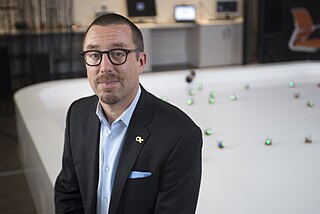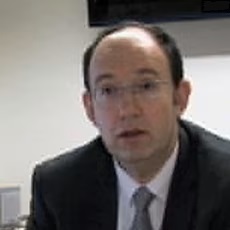
Jack Joseph Dongarra is an American computer scientist and mathematician. He is a University Distinguished Professor Emeritus of Computer Science in the Electrical Engineering and Computer Science Department at the University of Tennessee. He holds the position of a Distinguished Research Staff member in the Computer Science and Mathematics Division at Oak Ridge National Laboratory, Turing Fellowship in the School of Mathematics at the University of Manchester, and is an adjunct professor and teacher in the Computer Science Department at Rice University. He served as a faculty fellow at the Texas A&M University Institute for Advanced Study (2014–2018). Dongarra is the founding director of the Innovative Computing Laboratory at the University of Tennessee. He was the recipient of the Turing Award in 2021.

Eduardo Daniel Sontag is an Argentine-American mathematician, and distinguished university professor at Northeastern University, who works in the fields control theory, dynamical systems, systems molecular biology, cancer and immunology, theoretical computer science, neural networks, and computational biology.
Ashok Jhunjhunwala is an Indian academic and innovator. He received his B.Tech. from the Indian Institute of Technology, Kanpur and PhD from the University of Maine. He has been a faculty member at the Indian Institute of Technology Madras since 1981. He is the President of IIT Madras Research Park and Chairman of International Institute of Information Technology, Hyderabad. During his career, he has contributed extensively to technology innovation and adoption in the Indian context.

Randal E. Bryant is an American computer scientist and academic noted for his research on formally verifying digital hardware and software. Bryant has been a faculty member at Carnegie Mellon University since 1984. He served as the Dean of the School of Computer Science (SCS) at Carnegie Mellon from 2004 to 2014. Dr. Bryant retired and became a Founders University Professor Emeritus on June 30, 2020.

Magnus B. Egerstedt is a Swedish-American roboticist who is the Dean of the Henry Samueli School of Engineering at the University of California, Irvine. He was formerly the Steve C. Chaddick School Chair and Professor at the School of Electrical and Computer Engineering, Georgia Institute of Technology.
Vijay Kumar is an Indian roboticist and UPS foundation professor in the School of Engineering & Applied Science with secondary appointments in computer and information science and electrical and systems engineering at the University of Pennsylvania, and became the new Dean of Penn Engineering on 1 July 2015.

Sir Anthony Charles Wiener Finkelstein is a British engineer and computer scientist. He is the President of City St George's, University of London. He was Chief Scientific Adviser for National Security to HM Government until 2021.

Jerry M. Woodall is a professor of electrical and computer engineering at the University of California, Davis who is widely known for his revolutionary work on LEDs and semiconductors. Over the course of his career, he has published close to 400 scientific articles and his work has directly contributed to the development of major technologies that are used around the world, such as TVs, optical fibers, and mobile phones. Woodall currently holds over 80 U.S. patents for a variety of inventions and has received prestigious awards from IBM, NASA, and the U.S. President for his contributions to science, technology, and humanity.
John Patrick Hayes is an Irish-American computer scientist and electrical engineer, the Claude E. Shannon Chair of Engineering Science at the University of Michigan. He supervised over 35 doctoral students, coauthored seven books and over 340 peer-reviewed publications. His Erdös number is 2.

Chai Keong Toh is a Singaporean computer scientist, engineer, industry director, former VP/CTO and university professor. He is currently a Senior Fellow at the University of California Berkeley, USA. He was formerly Assistant Chief Executive of Infocomm Development Authority (IDA) Singapore. He has performed research on wireless ad hoc networks, mobile computing, Internet Protocols, and multimedia for over two decades. Toh's current research is focused on Internet-of-Things (IoT), architectures, platforms, and applications behind the development of smart cities.

Oussama Khatib is a roboticist and a professor of computer science at Stanford University, and a Fellow of the IEEE. He is credited with seminal work in areas ranging from robot motion planning and control, human-friendly robot design, to haptic interaction and human motion synthesis. His work's emphasis has been to develop theories, algorithms, and technologies, that control robot systems by using models of their physical dynamics. These dynamic models are used to derive optimal controllers for complex robots that interact with the environment in real-time.
Stephen P. Boyd is an American professor and control theorist. He is the Samsung Professor of Engineering, Professor in Electrical Engineering, and professor by courtesy in Computer Science and Management Science & Engineering at Stanford University. He is also affiliated with Stanford's Institute for Computational and Mathematical Engineering (ICME).

Saraju Mohanty is an Indian-American professor of the Department of Computer Science and Engineering, and the director of the Smart Electronic Systems Laboratory, at the University of North Texas in Denton, Texas. Mohanty received a Glorious India Award – Rich and Famous NRIs of America in 2017 for his contributions to the discipline. Mohanty is a researcher in the areas of "smart electronics for smart cities/villages", "smart healthcare", "application-Specific things for efficient edge computing", and "methodologies for digital and mixed-signal hardware". He has made significant research contributions to security by design (SbD) for electronic systems, hardware-assisted security (HAS) and protection, high-level synthesis of digital signal processing (DSP) hardware, and mixed-signal integrated circuit computer-aided design and electronic design automation. Mohanty has been the editor-in-chief (EiC) of the IEEE Consumer Electronics Magazine during 2016-2021. He has held the Chair of the IEEE Computer Society's Technical Committee on Very Large Scale Integration during 2014-2018. He holds 4 US patents in the areas of his research, and has published 500 research articles and 5 books. He is ranked among top 2% faculty around the world in Computer Science and Engineering discipline as per the standardized citation metric adopted by the Public Library of Science Biology journal.

David Atienza Alonso is a Spanish/Swiss scientist in the disciplines of computer and electrical engineering. His research focuses on hardware‐software co‐design and management for energy‐efficient and thermal-aware computing systems, always starting from a system‐level perspective to the actual electronic design. He is a full professor of electrical and computer engineering at the Swiss Federal Institute of Technology in Lausanne (EPFL), Associate Vice President of Research Centers and Platforms, and the head of the Embedded Systems Laboratory (ESL). He is an IEEE Fellow (2016), and an ACM Fellow (2022).
Karl Henrik Johansson is a Swedish researcher and best known for his pioneering contributions to networked control systems, cyber-physical systems, and hybrid systems. His research has had particular application impact in transportation, automation, and energy networks. He holds a Chaired Professorship in Networked Control at the KTH Royal Institute of Technology in Stockholm, Sweden. He is Director of KTH Digital Futures.

Moeness G. Amin is an Egyptian-American professor and engineer. Amin is the director of the Center for Advanced Communications and a professor in the Department of Electrical and Computer Engineering at Villanova University.
Vijaykrishnan Narayanan is the A. Robert Noll Chair Professor of Computer Science and Engineering and Electrical Engineering, Evan Pugh University Professor and the Associate Dean for Innovation at The Pennsylvania State University. He also serves as the director of the Penn State Center for Artificial Intelligence Foundations and Engineering Systems, and as the interim director of limited submission for the University's Office of the Senior Vice President of Research.

Prabhat Mishra is a Professor in the Department of Computer and Information Science and Engineering at the University of Florida. Prof. Mishra's research interests are in hardware security, quantum computing, embedded systems, system-on-chip validation, formal verification, and machine learning.
Sonia Martínez Díaz is a Spanish mechanical engineer whose research applies control theory to the coordinated motion of robot swarms and mobile wireless sensor networks. She is a professor in the Department of Mechanical and Aerospace Engineering at the University of California, San Diego.
Luca P. Carloni is a professor and chair of the Department of Computer Science at Columbia University in the City of New York.. He has been on the faculty at Columbia since 2004. He is an international expert on electronic computer-aided design.












